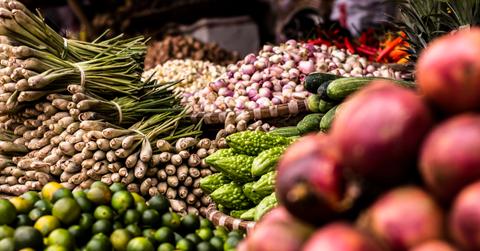How 2 Innovative Startups Are Finding New Ways To Revolutionize Food Waste
A full one-third of all the food produced globally for consumption goes to waste. Startups in the United States and Australia seek to change that with their innovative new programs that turn food waste into good for the whole community.
Updated May 24 2019, 6:57 a.m. ET
A full one-third of all the food produced globally for consumption goes to waste. That’s 1.3 billion tons in brass tacks.
Startups in the United States and Australia seek to change that with a new food-rescue supermarket down under, and a new technology here at home, that turns what used to be food waste into good for the whole community.
The Wizards of OzHarvest
OzHarvest, Australia’s first perishable food rescue organization, has now opened a rescued-food supermarket called OzHarvest Market.
Based in Kensington, Sydney, OzHarvest was founded in 2004 in order to distribute high-quality, surplus food donated by more than 2,000 commercial outlets such as hotels, stadiums, delis and supermarkets to more than 900 charity organizations. These donations include baked goods, sandwiches, sliced or fresh meat, and produce that is past its expiration date but still perfectly edible.
OzHarvest Market now offers a centralized pick-up location in Sydney for those donations and asks customers to pay what they can. "The OzHarvest Market is our latest innovation to tackle food waste and eliminate hunger,” OzHarvest CEO Ronni Kahn said in a statement. “It supports OzHarvest's purpose to nourish our country, by making sure good food does not go to waste and is available to everyone.”
Pay scale at the volunteer-run grocery store is set up on the honor system. "If times are tough and you're in need of food or other goods, you can take what you need, if you can give something, then please do, it could even be your time or skills," Kahn said.
From food to fertilizer
KDC Ag, a subsidiary of the Kamine Development Corp in Jersey, has partnered with California Safe Soil to create a patented, aerobic-digestive enzymatic process to quickly turn food waste from supermarkets into high-quality fertilizer. The process, they claim, is 720 times as efficient as traditional composting. That would make a significant dent in the 60 million metric tons of food wasted annually in the United States alone.
KDC Ag takes discarded, perishable food from grocery stores, gives what it can to charity, and takes the rest—including meat and bones—to turn into a fertilizer the company is calling Harvest-to-Harvest, or H2H, that test trials show to boost crop yield by as much as 40 percent with a quarter less water.
KDC Ag already has one functioning food-waste facility in Sacramento, Calif., with another under construction in New Jersey. The California location can take on five tons of food waste an hour—the New Jersey location is expected to do five times that. The company’s bold claim? To contribute to the complete elimination of food waste in the US within five years.
Now there's an idea we can all rally behind.
